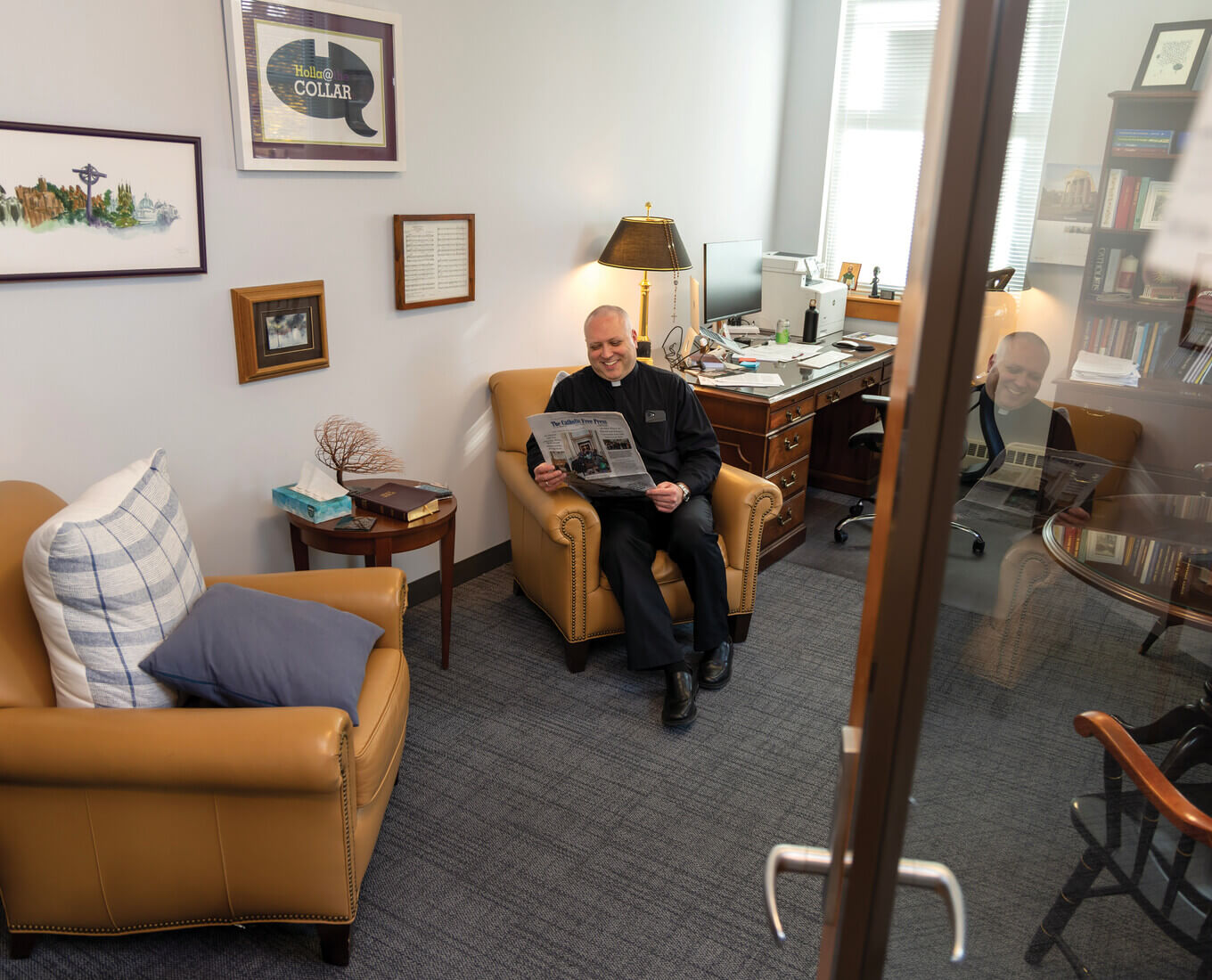Known colloquially as “the Ignatian plus-sign,” the Presupposition is St. Ignatius’ first instruction to spiritual directors and retreatants in his singular contribution to Christian spiritual life, the Spiritual Exercises.
During a particularly contentious period on campus, I began carrying a pocket-sized reminder of the conditions for right relationship, especially during disagreement. Beside a picture of St. Ignatius of Loyola, I had typed the words of the “Presupposition.” In difficult clashes of perspective, I would take out the cheat sheet I had created and remember to assume good intentions, to give others the benefit of the doubt and to ask good questions when I was tempted to automatically dismiss or negate another’s idea or perspective.
In the version translated by Rev. George E. Ganss, S.J., the Presupposition reads:
“…it should be presupposed that every good Christian ought to be more eager to put a good interpretation on a neighbor’s statement than to condemn it. Further, if one cannot interpret it favorably, one should ask how the other means it. If that meaning is wrong, one should correct the person with love; and if this is not enough, one should search out every appropriate means through which, by understanding the statement in a good way, it may be saved.”
These are rather straightforward instructions for the spiritual director and retreatant to seek and maintain mutual respect: Be eager to see the good. Ask clarifying questions. Correct with love. Endeavor toward mutual understanding.
In the context of giving and receiving the Spiritual Exercises, the Presupposition is a reminder that God is at work, communicating directly and offering insight. In cooperating with God, it seems the least the director and retreatant can do is to assume good intentions on one another’s part. In my own experience as an exercitant, the generous listening and patient probing of my spiritual director only enhanced what I was understanding as God’s work within me. Indeed, receiving and giving the benefit of the doubt also opened my eyes and my heart to the ways in which God was at work within others, as well. There was a holiness in the director-retreatant relationship that was based on mutual respect and openness, and I found it easier to seek and find what was good and true in the other’s statements and suggestions.
Alas! As one spiritual director told me, “Even Jesus had to come down from the mountain.” Meaning that as the Spiritual Exercises were coming to a close for me, my task was to seek and find that same quality of holiness, or right relationship, within my everyday encounters. In the context of everyday life, that direction, like the tenets of the Presupposition, proves to be deceptive in its simplicity.
In a world where zero-sum debate and argument are reflexive, where those who hold differing viewpoints are immediately viewed with suspicion, and where mutual vulnerability and dialogue are far from mainstays in daily interactions, applying the Ignatian plus-sign is often a difficult, and sometimes insurmountable, task. The Presupposition requires that we sidestep the conventions of persuasion and declaration in favor of generosity and curiosity. This is more challenging than it seems at first blush. In environments where there are winners and losers in any discussion, the advice to “put a good interpretation on a neighbor’s statement” may feel like a disadvantage. If the goal is to win an argument at all costs, it probably is. But if the goal is to understand one another’s point of view, the Presupposition opens the way to healthier relationships at home and at work, more effective collaboration and, perhaps, more imaginative problem-solving.
Admittedly, the principles of the Presupposition are a more comfortable fit for the space and purpose of a directed experience of the Spiritual Exercises. In retreat mode, perhaps more so than in our daily lives, we are predisposed toward some of the spiritual habits that make it easier to adopt and apply the Ignatian plus-sign. In order to assume good intentions and pursue right relationship, the Presupposition asks us to enter spiritual direction with humility, lean into generosity of thought, listen deeply and attentively and ask questions for clarity and understanding. Imagine what it might look like to practice these postures of presupposition at home and at work.
Humility: In some ways, to be humble is to admit to one and all that we do not know everything and, moreover, that most times we don’t know what we do not know. To be sure, in a knowledge economy the proposition of confessing to not knowing creates an uncomfortable level of vulnerability. Yet there is power in welcoming the insight of others, allowing others’ expertise to shine, and learning something new and unexpected. Facing the limits of our own knowledge and experience can also help us to be gentle and forgiving when others reach the edges of theirs. Suppose we all entered conversations eager enough to learn that we allow ourselves to be vulnerable and say, “I don’t know.”
Generosity: Generous thinking helps us ground ourselves in the knowledge that each and every person is beloved of God. The Presupposition calls us deeper into this reality and to accept that our conversation partners are good people who, just like us, are doing the best they can with what they have. My mother used to encourage me with these words: “Remember that we are all God’s children; no one is better than you, and you are no better than anyone else.” In some ways, my mother’s wisdom mirrors St. Ignatius’ directive to be eager to see the good. As Rev. James Martin, S.J., observed, “We expect others to judge us according to our intentions, but we judge others according to their actions.” Instead, suppose we all decided to give to others the same benefit of doubt, the same allowance for complexity, that we give ourselves or that we expect others to give us?
Deep and attentive listening: Of all the habits required to faithfully apply the Ignatian plus-sign, deep and attentive listening is most elusive for me. Almost on a daily basis I find myself listening, not for understanding, but for positioning and rebuttal. If I am not busying myself with trying to think several steps ahead of whoever is speaking, I am attending to email or the morning news or some other “important” task. Judging from what I observe in my workplace and in my home, I am guessing that I belong to a community of poor listeners. Usually there is safety in numbers, but in this case being one of the pack only contributes to a larger problem. In taking attention off the speaker, whether a family member or a colleague, and putting it on our own business, not only are we missing the person’s meaning and creating the circumstances for miscommunication, we are also showing the type of disrespect that leads to unhealthy relationships. Suppose instead of multitasking, we all gave each other the attention we deserve? Suppose instead of looking for fissures to exploit in another’s perspective, we all looked for and called attention to what is true and beneficial?
Questions for clarity and understanding: Occasionally, it happens that someone offers a perspective replete with error such that there is little to salvage let alone offer as beneficial. In these circumstances, Ignatius was clear: Correct with love. However, before arriving at that point, Ignatius was also clear that the first step is to ask for clarity. If we are assuming good intentions on the part of our conversation partner, we are also allowing that we may have misunderstood what was said. The well-placed question for understanding both guards against unnecessary confusion and provides the conversation partner enough space to course correct gracefully. Questions for clarity and understanding are a much more humane approach to situations that would otherwise end in conflict or impasse. Whereas statements and declarations close off possibility, questions open us. Asking thoughtful questions, rather than “questioning,” can also shift momentum in a discussion and create space for new perspectives to emerge. Suppose we all suspended judgment long enough to ask questions as a way of seeking understanding?
Humility. Generosity. Deep and attentive listening. Questions for clarity and understanding. These are the tools and habits I associate with the Presupposition. They allow me to slow down and assume that others have good intentions just as I hope they assume good intentions of me. These are the tools that encourage me to seek clarification rather than jump to conclusion. And these are the tools that help me to correct wrong statements with the same love and respect I hope to receive.
Even with my homemade card to aid me, however, applying the Ignatian plus-sign in daily life can be enormously challenging. Gratefully, one of St. Ignatius’ insights was that God labors throughout all the nooks and crannies of our lives.
So, I continue trying to presuppose. By no means am I great or even good, but I am learning — and I know God is at work in the midst of the learning. When I am practicing and making strides, I can sense the difference the Presupposition makes in the quality of interactions at home and at work, and I experience silhouettes of the same grace I experience in the midst of spiritual direction. The spirit of competition and self-absorption gives way to cooperation and generosity. In Ignatius’ words, consolation is more abundant than desolation. The reverse is also true. When the Ignatian plus-sign eludes me (or when I elude it), I find myself more troubled by the quality — or lack thereof — of my interactions with others. Even when I am the only one in the room playing by the rules of presupposing and trying to apply the Ignatian plus-sign in my every day, God’s grace is present. When others presuppose, too, God’s grace feels multiplied. I want to live in a world of God’s infinite grace, and so I wonder: Suppose we all presupposed? ■
Michele C. Murray is senior vice president for student development and mission at Holy Cross. This piece was originally published in Conversations on Jesuit Higher Education (conversationsmagazine.org) and appears in the second edition of “An Ignatian Spirituality Reader (Second Edition).”


